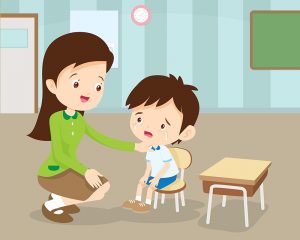By Sabrina Brient.
Grief is a known response to loss. This loss can be a result of death; the death of a family member or friend, a pet. It can also occur in the context of other events that constitute a loss. For example:
- A family breakdown, or the separation of parents
- A family member or friend moving away
- Moving to a new school or home
- Being diagnosed with a disability or illness, or someone else being diagnosed
- Loss related to natural disasters or crises
- Losing an item of significance or importance
How a child understands and expresses their grief can be influenced by their age, development, and past experiences. They can fluctuate in their grief, experiencing many feelings at once, or becoming numb and shut down. Their behaviour and mood can vary, appearing happy at times, and then seemingly dip into periods of sadness, distress, panic, confusion, or anger. Their feelings may manifest in physical symptoms (stomachaches, headaches), or poor sleep and even nightmares.
Some children may be able to express their feelings in language while others may express themselves through behaviour.
Regardless of age, their development or how they express themselves, grief in itself is both complex and difficult. As a parent, witnessing your child’s pain, perhaps while you are hurting too, can be deeply challenging.
Here are some tips to help you support your child when they are experiencing grief and loss:
- Maintain normal routines and structure, which can help them feel safe.
- Be patient and understanding about any behaviour they display – you might see an increase in the range of behaviour as they attempt to cope.
- Maintain your boundaries and consistent responses “Yes of course you can feel sad/mad/bad…but you still can’t hit me/your sibling”. This will reassure them that you are able to keep them safe when they are feeling out of control.
- Encourage them to communicate about their feelings if, and when they are ready. Talk to them about your feelings and what you are doing to cope-this allows them to see that feelings are safe and normal to have.
- As above, let them know that all feelings are okay, including anger, happiness, sadness, or even no visible reaction. Let them know it’s okay to be happy and have fun.
- Encourage relaxation and self-care and find time to connect with them when you can and do something enjoyable.
- Listen to them and provide clear and age-appropriate answers to their questions, even if they seem illogical. Try to use concrete words like “died” instead of “passed”- this clarity functions to aid their understanding and therefore their sense of safety.
- If you have lost someone, allow them to talk about the person and their loss. If someone has died, they might also talk about death as they attempt to make sense of what has happened. Try not to shut them down.
- It can be helpful to invite them to do something creative to express themselves, such as drawing, writing, play or music.
- Consider encouraging them to make something to remember their loved ones or a ritual to signify their death. Be mindful of allowing them to do this in their own time when they are ready.
- Encourage time with friends and supportive family members.
- Inform the school and other important people so they can provide additional support.
- Try to include them in decision-making when it directly affects them and provide them with the information they might need in an age-appropriate way.
Sometimes your own grief might make it difficult to provide this support.
If you too are affected by grief and are feeling distressed, consider asking another trusted adult to talk to your young person or to provide some assistance. This will allow you the space to seek support for yourself and look after your wellbeing first, so you can then support your child.
You could do this by connecting with your GP or a psychologist or calling a Helpline to speak with someone.
Some additional phone numbers that you or your child can call:
Your child can call: Kids Helpline: 1800 551 800
You can call: Parentline Victoria: 13 22 89
You can both call: Beyond Blue: 1300 224 636

